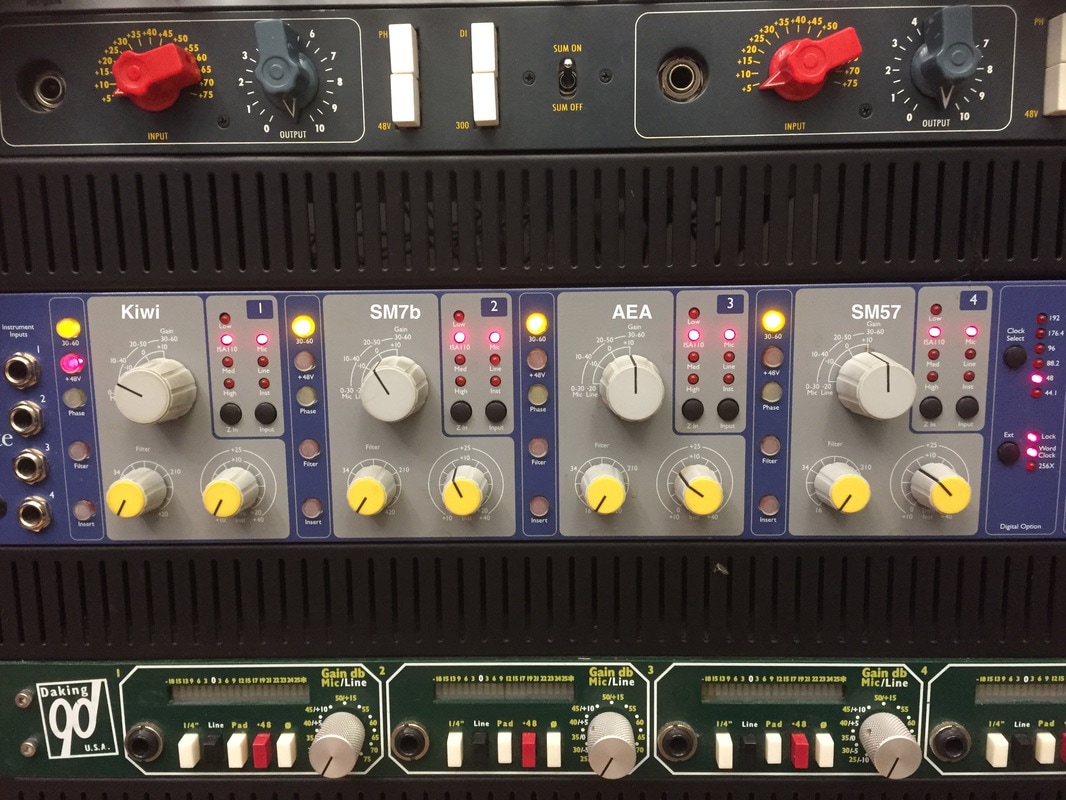|
I decided to perform a microphone shootout with a male vocalist in order to determine subtle and drastic sonic differences among four different microphones so that I may be better informed in the future when choosing a microphone for a sound source. I recorded Jalen Mitchell singing the first 8 bars of "Love" by Nat King Cole. Jalen is a very talented vocalist and is able to sing any style of music extremely well. I used a Focusrite ISA428 mkII for all four vocal recordings in order to maintain preamp consistency. For each recording I adjusted the input gain accordingly to avoid distortion and also attempting to relatively match a constant level so that all recordings were perceived at the same volume level.
Prior to the recording session, I researched some vocal recording techniques and tips to try out during the tracking process. I found that http://ehomerecordingstudio.com/recording-vocals/ gave a great overview of things to keep in mind such as sibilance, breath noise, room acoustics, and proximity effect. I was sure to consider all these factors before I hit the record button during the session. Another useful tip was employing a small amount of reverb to Jalen's headphones while recording in order to provide him with a sense of space with acoustic properties, just like he would expect if singing in a room or concert hall. I also learned a few tips from ledgernote.com/columns/mixing-mastering/tips-for-recording-and-mixing-vocals/. The article emphasized mic choice, proper isolation, and gain staging. I was sure to be mindful of my input levels to Pro Tools, since I wanted a consistent, non-distorted signal for each microphone. I chose the following microphones to record with: Blue Kiwi, Shure SM7b, AEA R84, and the Shure SM57. The Blue Kiwi has a nice and smooth frequency response that promotes clarity and overall bright tone. The Shure SM7b is a dynamic mic that is commonly used for vocals and broadcasting. It exhibits a dark tone with less detail than a condenser mic, and sibilance is less obvious. The AEA R84 is a bidirectional ribbon microphone that is commonly used for vocals and guitar among other applications. It exhibits a smooth frequency response with a bump in the low-mids. The Shure SM57 is a classic dynamic mic that has many uses. It is generally used as a guitar and drum mic since it handles high SPLs and is supposedly almost indestructible. The microphone placement for each mic is shown in the images below.
Preamp settings for each microphone
The Blue Kiwi microphone exhibited a bright, smooth frequency response that promoted clarity without sounding too harsh. The sibilance was a tad too harsh even with the use of a pop filter. The audio example is below.
The Shure SM7b had a dark sound with great clarity. Sibilance didn't present an issue due to the hyped low frequencies and less emphasized high frequencies. Audio example below.
The AEA R84 ribbon microphone presented a lot of low-mid frequencies, resulting in a very dark sound. Sibilance was not an issue, but the audio sounds a little muddy without any EQ to bring the low-mid frequencies under control. Audio example below.
The Shure SM57 dynamic mic came across as extremely bright, with an overwhelming amount of sibilance and harsh tone. Audio example below.
After observing the results of the characteristics of each microphone, I decided to rank them in order according to my tastes. 1 being the best, 4 being the worst. I based my rankings upon my observations as listed above before each audio example.
1. Shure SM7b 2. Blue Kiwi 3. AEA R84 4. Shure SM57
1 Comment
|

 RSS Feed
RSS Feed
